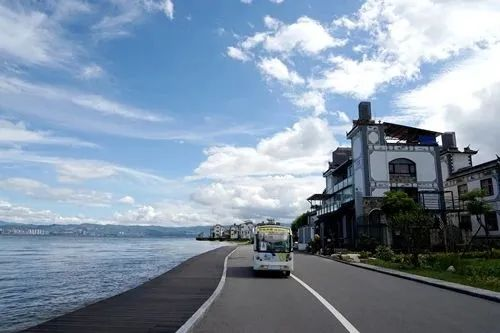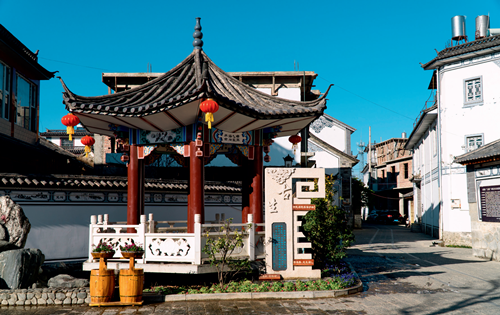MinSheng Weekly of People''s Daily | Gusheng Village in Dali City: Beautiful Days in Erhai Lake and Cangshan Mountain
2023-07-17
Recently, a report published on MinSheng Weeklyof People's Daily told the story of restoring the precious green water of the Erhai Lake by the Basin Wastewater Interception Project in an attractive ancient village, Dali Gusheng Village, and reviving the beautiful life there. The sunken-type reclaimed water plant near Gusheng Village adopts China Water Environment Limited's distributed sunken reclaimed water ecosystem to achieve full collection and nearby treatment of domestic sewage, 100% reuse of reclaimed water, and clear water flowing through the village again, which allows people to live and work in peace and contentment. It stands as a successful practice of China Water Environment Limited's distributed sunken reclaimed water ecosystem in helping protect the Erhai Lake and promoting green and sustainable development.
Gusheng Village, with a history of nearly 2,000 years, is situated along the sea. It belongs to the Zhongzhuang Village Committee of Wanqiao Town, Dali City, facing east towards the Erhai Lake and extending west to Dali Road. It covers an area of 140.5 hectares, with the village proper occupying 28.03 hectares. It is divided into 5 village resident groups, with 1 Party branch and 5 Party groups, totaling 66 formal Party members. The entire village consists of 439 households and 1842 residents.
In 2014, Gusheng Village was honored to be included in the third batch of Chinese Traditional Villages list. In 2020, Dali Bai Autonomous Prefecture was selected as a national model prefecture for the centralized protection and utilization of traditional villages.
The village's economy is primarily based on the cultivation of high-quality rice, flue-cured tobacco and conventional vegetables, and the migrant work. It enjoys convenient transportation, with a drive of about 50 minutes from Dali City, and there's also a dedicated rural bus line. Being there, one can admire the thousand-year-old village scenery of the Bai ethnic group, savor the Bai cuisine, and wander along the ecological corridor for a close-up view of the enchanting Erhai Lake at a leisurely pace.
In July 2021, the Party branch of Gusheng Village was rated as a "National Advanced Primary-level Party Organization".In 2022, the per capita net income reached 15,875 yuan, nearly tripling that of 2012.


Erhai Lake Ecological Corridor
"Without ink, the Cangshan Mountain reveals a myriad of ever-changing landscapes; without strings, the Erhai Lake plays a variety of eternal melodies. .
For thousands of years, literati have penned numerous poems and couplets in praise of Dali which is often associated with "poetry and faraway places," making it a captivating destination for tourists from home and abroad. And the Erhai Lake, known as the "Mother Lake" by locals, stands as a splendid label of Dali.
In January 2015, General Secretary Xi Jinping visited Gusheng Village in Wanqiao Town, Dali City. Walking on the wooden plank road and taking a photo with local officials, he remarked, "Let's keep this picture as a record and I hope the water will be even cleaner and clearer upon returning in a few years." He emphasized that the Erhai Lake must be well-preserved.
It's hard to imagine that the tranquil Erhai Lake, resembling a mirror at present, was once invaded by blue-green algae, subjected to the ravages of time, and faced with crises. In recent years, the rapidly growing industry, agriculture and urbanization have intensified activities such as reclaiming land from lakes, deforestation, and fish farming in cages. Local residents witnessed with sadness and anxiety the foul-smelling sewage flowing into the Erhai Lake.
In order to restore the precious green water, Yunnan Province launched a campaign to defend the Erhai Lake. Over the past eight years, Party committees and governments at various levels in Dali Bai Autonomous Prefecture and Dali City have attached great importance to protecting the Erhai Lake. They implemented the "Seven Major Actions" and "Eight Key Battles" for the protection of the Erhai Lake, as well as measures like "Three Prohibitions and Four Promotions" to reduce the diffused pollution. "Three Prohibitions" include no use of nitrogen and phosphorus-containing fertilizers, no use of high-toxicity and high-residue pesticides, and no cultivation of crops with abundant irrigation and fertilization (mainly garlic). In addition, sewage collection networks were constructed for every household to prevent wastewater from flowing into the Erhai Lake.
Nowadays, upon opening the door and gazing outward, the clear water shimmers in the sunlight, with the reflections of the blue sky and white clouds harmoniously intertwined with the fine waves in the Erhai Lake, showing the steadily improving water quality. "Looking at the crystal-clear Erhai Lake, our mood is also different," proudly said He Qiaokun, the Party Branch Secretary of Gusheng Village, to a reporter from MinSheng Weekly.
Clear Erhai Lake, Prosperous Dali
In the flourishing June of midsummer, the reporter went to Gusheng Village, who was greeted by the traditional white-walled, blue-green-tiled houses of the Bai people adorned with poetic and picturesque drawings. A meandering stream flowed along the blue-green stone channel, passing through water willows on the tidal flats, like an ethereal and simple ink painting.
In the early morning, under the pear trees at the entrance of the lane, several elderly men were sitting there and engaged in casual conversation. And He Qiaokun was among them. Standing up slowly, he walked towards the reporter with a pot of freshly brewed tea.
Speaking of the changes in Gusheng Village over the years, he said, "There was a time when the migratory birds stopped coming due to the polluted lake water, and the lake fish and shrimp no longer taste fresh. And there were several outbreaks of blue-green algae near the village. However, in recent years, people have stopped discharging sewage and littering at will. Everyone has realized that protecting the environment and the Erhai Lake is not for others, but for themselves. .
On January 20th, 2015, General Secretary Xi Jinping went to Gusheng Village, Wanqiao Town, Dali City, Dali Bai Autonomous Prefecture, Yunnan Province for investigation and research. Near the Erhai Lake, General Secretary Xi carefully inspected the ecological protection wetlands and received a briefing on the conservation of the Erhai Lake. He emphasized that the economy should not be developed at the cost of destroying the environment. Environmental protection is a long-term task that requires persistent efforts. It is crucial to ensure the effective preservation of the Erhai Lake, allowing the natural beauty of the Cangshan Mountain and Erhai Lake to endure through ages.
"I was right there at that time, extremely excited and deeply inspired," said He Qiaokun, still vividly recalling the scene after many years.
Over the past eight years, officials and people of all ethnic groups in Dali Bai Autonomous Prefecture have always kept in mind the earnest instructions of General Secretary Xi Jinping. Through a series of measures such as the implementation of the basin wastewater interception project, the construction of ecological corridor, and the prevention and control of agricultural diffused pollution, the Erhai Lake protection has been transformed from "single-lake governance" to "whole-region governance" and "ecological governance."
During a walk on roads paved with clean and tidy blue-green stone slabs, the peculiar reservoir system formed by multiple interconnected ponds in the village came into the reporter's sight. Passing through the village, the clear flowing water carries no unpleasant odors, adding a touch of tranquil charm to this already picturesque village.
He Qiaokun said, "This is our basin wastewater interception project, using a 'distributed sunken reclaimed water ecosystem' to intercept domestic sewage from entering the Erhai Lake and treat the sewage nearby. Now every village has access to the pipe network and domestic sewage is not allowed to be directly discharged into the Erhai Lake. It can be then reused as reclaimed water after being treated to meet the standards in the sewage treatment plant.
"Before the completion of the main wastewater interception network, we shut down many restaurants and inns. The goal was to halt sewage discharge first and then swiftly construct environmental facilities to ensure that sewage would be collected into the pipe network," recalled He Qiaokun. After a period of rectification, many compliant restaurants and inns have reopened.
"As for the intercepted sewage, how is it treated? Whether the sewage treatment plant located around the Erhai Lake will affect the tourists' experience or not? .
With these questions in mind, the reporter entered a sunken-type reclaimed water plant in Dali City. Upon entrance, the entire factory was surrounded by lush greenery, and it was not smelly at all. It was hard to imagine that this was a sewage treatment plant.
"We always bear in mind the instructions of General Secretary Xi, consistently taking 'Clear Erhai Lake and Prosperous Dali' as our fundamental development philosophy. In recent years, six new plants for sewage treatment have been built around the Erhai Lake, with a daily treatment capacity of nearly 54,000 cubic meters in the short term and 118,000 cubic meters in the long term. And the treated water meets the national Grade I Class A standard for discharge, " explained Li Jianjun, the head of the reclaimed water plant.
Li Jianjun added, "Our plant is built underground, having no impacts on the surrounding residents' lives and the landscape of the Erhai Lake. The treated water can also be used for ecological water supplementation in rivers, firefighting, greening, irrigation in farmland and so on. .
Hard work pays off. Through the concerted efforts of the Party committees and governments at various levels in Dali Bai Autonomous Prefecture and Dali City, coupled with the increasing awareness of the villagers, who are steadfast in their commitment and care, the Erhai Lake has now restored its former pristine appearance, resembling silver and jade. An effective long-term mechanism for garbage collection and disposal, with a system of "household for cleaning, village for collection and town for disposal" has been implemented in Gusheng Village. This mechanism achieves full coverage of household collection and treatment of courtyard sewage after centralized collection.
"The water of the Erhai Lake is getting cleared and its quality is improving, seeing a growing variety of migratory birds there. More tourists travel here, and the villagers' incomes have increased. " said He Qiaokun, with a beaming smile spreading across his face.
As the sun sets, wisps of smoke straggled up through courtyards shaded by green trees. A batch of people-benefiting eco-tourism industries, such as village tours with ethnic characteristics and ecological wetland sightseeing tours, are quietly flourishing in Gusheng Village.


Distinctive Bai Ethnic Residential Architecture in Gusheng Village
Admiring Ancient Charm, Experiencing Hometown Nostalgia
As you walk along Gusheng Village towards the lakeside, you will encounter an ecological corridor formed by physical barriers and environmental protection measures. On the left lies the clear Erhai Lake, while on the right sit courtyards with green-blue-tiled roofs and white walls. Being there, it feels like stepping into a picturesque scenery, where all the unpleasant feelings disappear.
Along this ecological corridor, there is a place that one should not miss. It is Hometown Nostalgia Courtyard.
On January 20th, 2015, during his visit in Gusheng Village, General Secretary Xi Jinping had a warm conversation with the local Bai community in the courtyard of villager Li Dechang. General Secretary Xi Jinping remarked, "The environment here is tidy, maintaining its quaint form. Such courtyards which evoke a sense of hometown nostalgia are better than Western-style houses. " "Seeing your way of life, I feel quite envious and want to stay here much longer. .
Li Dechang, 55 years old, was born and grew up in Gusheng Village. He went out to work when he was young and then found employment at the power supply station in the town. Eight years later, Li Dechang still had a vivid memory of the scene at that time. "General Secretary came to our house and asked about our family life. He inquired about what we usually use for cooking. I mentioned using an electric rice cooker, an induction cooker and a gas stove, which are environmentally friendly and cost-effective. General Secretary said that it is good for environmental protection. .
Set against the Cangshan Mountain and near the Erhai Lake, the residential architecture of Bai ethnic people with the "three squares and one screen wall" layout, along with the lush and verdant courtyard scenery, won praise from General Secretary. "Back then, we were sitting around this small table, General Secretary urged us to protect the Erhai Lake well. He also said that the environment here is tidy, maintaining its quaint form. Such courtyards which evoke a sense of hometown nostalgia are better than Western-style houses, " said Li Dechang.
"At that time, we did not quite get the meaning of hometown nostalgia. Later, General Secretary explained to us what it means. It is when you come to a place and are reluctant to leave as you miss it, which is called 'hometown nostalgia', " Li Dechang told the reporter. And since that day, Li named this small courtyard "Hometown Nostalgia Courtyard."
"We will keep this courtyard well-maintained, just as it was before and after the General Secretary's visit. We will also protect this sense of hometown nostalgia and tell the story of hometown nostalgia well, " said Li Dechang.
Strolling through the village, the ancient and elegant screen walls, depicting the charm of the Bai ethnic culture, are a unique cultural phenomenon, often incorporating features such as "fengshui walls," "cultural walls" and "light-penetrating walls". Ancient bridges, ancient trees and ancient stages can be found everywhere, showcasing the beauty of the thousand-year-old Gusheng Village.
"Our village has a history of over 2,000 years, and there are many ancient architectures. Cultural relics such as the Fuhai Temple and Fengming Bridge built in the Ming Dynasty, as well as the ancient stage and Dragon King Temple built in the Qing Dynasty, are still well-preserved, " said He Qiaokun, standing beneath a large tree with an age of more than 300 years, to the reporter.
Admire the ancient charm and experience the hometown nostalgia. In no time, people are drawn to this place, and hometown nostalgia is endowed with a new significance in the modern era. Nowadays, people come from far and wide to travel in Gusheng Village, gathering here to seek the long-lost sense of hometown nostalgia.
In the summer, the Erhai Lake shimmers under the morning sunlight.
Just as the day breaks, several individuals in orange vest are busy with something near the Erhai Lake in Gusheng Village. When the reporter approached for an inquiry, "I am part of the blue-green algae harvesting team, mainly responsible for harvesting aquatic plants and clawing the ditches in the Erhai Lake. Recent years have seen a noticeable increase in tourists visiting our village, so we must do more to protect the Erhai Lake well. Witnessing it become clearer and clearer, I feel very proud, " said Yang Lihong, the head of the blue-green algae harvesting team in Wanqiao Town.
Not only Yang himself, but also his father and wife are environmental guardians of the Erhai Lake. Since the protection campaign of the Erhai Lake began in 2016, Yang Lihong and his wife actively signed up and joined the lake protection efforts. His wife now is a member of the female algae harvesting team, and it has become a routine for the couple to leave home early and return late.
"We do this throughout the year. If it is cold, just wear more clothes," said Yang Lihong, with his sun-kissed face breaking into a simple smile. Yang Lihong, together with his "comrades" and family, has dedicated many years of action to protect the Erhai Lake.
"I usually leave home at 8 a.m. and go home at 5 p.m., " said Yan Bingqi, the deputy head of the harvesting team, "I never find it boring. These tasks must be done by someone. " For him, it is not just a job to safeguard the ecological environment of the Erhai Lake in Wanqiao Town area, but has already become a part of his life.
"The Erhai Lake is our 'Mother Lake'. I grew up here, and back then its water rated as Class I was suitable for direct consumption. Later, more houses were built near the lake and it suffered some pollution. However, the ecological corridor has been established and many policies for the Erhai Lake protection have been implemented by the government. Watching its water quality gets improved day by day, the effort is worthwhile, " said Yan Bingqi with satisfaction.
When the sun rises, there are many people on the boats along the Erhai Lake, bending down with rakes to collect aquatic plants. And countless other villagers, including beach administrator, river management officers, and field water supervisors, fulfill their duties at their posts. They patrol along the Erhai Lake every day, all for the restoring of the pristine Erhai Lake.
Over the years, Gusheng Village has adhered to the concept of building a beautiful countryside by leveraging the existing resources and maintaining the natural pattern, which allows the residents to see the mountains and water, and to remember hometown nostalgia. It lets more tourists experience the leisure and comfort unique to the area near the Cangshan Mountain and the Erhai Lake, appreciating the harmonious coexistence of humanity and nature.
As tourists praise the picturesque scenery of Gusheng Village during their leisurely stroll, perhaps only the locals who have lived there for a lifetime truly understand how hard-won this beauty is. It is a result of the collective efforts of the whole village over the years.
A Blend of Scientific Research and Hometown Nostalgia
Blessed with picturesque landscapes, Gusheng Village is nestled against the Cangshan Mountain and faces the Erhai Lake. It embodies a profound sense of traditional agricultural civilization, while embracing a spirit of progress and forward-looking vision.
Not far from Gusheng Village, along the Yangxi River, a courtyard caught the reporter's attention. At the entrance, a prominent inscription on the wall reads, "Resolve the hardships of people's livelihoods, and educate talents from four corners of the world." Upon inquiry, it was revealed to be a technology institute, jointly established by China Agricultural University, Yunnan Agricultural University, and the People's Government of Dali Bai Autonomous Prefecture.
The primary task of this institute is to protect the Erhai Lake, promote income growth for farmers, and facilitate the green transformation of agriculture. By leveraging scientific technology and talent support, they aim to comprehensively contribute to rural revitalization.
Currently, there are more than 20 resident professors and 14 master's students at the technology institute, with over 200 experts and scholars from various places often visiting for exchanges and research. They live and work alongside local farmers, offering zero-distance, zero-threshold and zero-cost services.
"Every day, even when it is cloudy or rains, we have to collect water samples from ditches. We will center on the monitoring during the rainy season, as fertilizers and pesticides can be washed away by rain, which results in surface infiltration. However, sampling on rainy days can be more challenging, " said Yao Chenxi, a third-year graduate student residing at the institute.
Even before her graduate studies, Yao Chenxi has been involved in the Erhai Lake protection. After the official unveiling of Gusheng Village Technology Institute in February last year, she came to join the institute. Away from the hustle and bustle of urban life, surrounded by vast and fertile farmland, she has tirelessly contributed to the precise analysis of agricultural diffused pollution.
On regular days, Yao Chenxi is often seen in the rice fields. She is mainly responsible for the daily monitoring and rainfall monitoring at 21 key monitoring points of the "six vertical and seven horizontal" monitoring system in the Gusheng area. She conducts measurements of water depth, flow rate, and other indicators, and collects water samples every morning, noon and evening, often enduring long exposure under the scorching sun. Despite wearing sunscreen clothing, her face still gets tanned by the ultraviolet rays. But she has never complained about coming here, "Now our major task is to precisely prevent and control basin diffused pollution, develop green and high-value agriculture, and inherit the hometown nostalgia and local culture. I am honored to contribute my part to this, " she said, with a warm smile gradually blooming on her face.
Chen Cong, from Bijie, Guizhou Province, is also one of the graduate student residing here. Chen came to the institute this spring, participating in the cultivation of fresh corn.
"There is a significant difference between cultivating corn in the fields and what is taught in textbooks. Here, we also consult local farmers for some practical cultivation techniques. They teach us local folk songs and dances, and help us experience their ethnic culture in a warm manner. " said Chen Cong.
"When we first came here, some villagers would ask us to conduct water quality tests for them. But that's no longer the case, as everyone is very confident about the water quality of the Erhai Lake. " Gradually, Chen Cong integrated into the local community and became friends with those villagers. "Watching the fresh corn planted by myself grow day by day, I feel a sense of accomplishment," said Chen Cong, with a slight smile.
In this tranquil and comfortable small village, near the vast clear Erhai Lake, this group of teachers and students resides at the forefront of agricultural production, practicing the spirit of the 20th National Congress of the Communist Party of China and protecting the Erhai Lake with their own practical actions.
Li Xiangyu, a villager who contracted about a hundred mu of farmland in Gusheng Village for ecological cultivation, said with contentment, "Since the establishment of the technology institute, our village has become noticeably more vibrant. They are young and energetic, helping villagers to increase income and efficiency while providing us with a lot of scientific planting knowledge. We welcome more knowledgeable young people to come here.


"The Erhai Lake Must be Well-protected", AStone Carving Near the Erhai Lake in Gusheng Village
Protect the Lush Mountains and Lucid Waters
According to General Secretary Xi Jinping in the report of the 20th CPC National Congress, nature provides the basic conditions for human survival and development. Respecting, adapting to, and protecting nature is essential for building China into a modern socialist country in all respects. We must uphold and act on the principle that lucid waters and lush mountains are invaluable assets, and we must remember to maintain harmony between humanity and nature when planning our development.
As the time goes on, this enduring concept has shown even more remarkable vitality.
In January 2015, General Secretary Xi Jinping, during his visit in Dali, made the instruction that "the Erhai Lake must be well-protected" and praised the countryside of Dali. The officials and people of all ethnic groups in Dali Bai Autonomous Prefecture have kept in mind this instruction and worked hard with gratitude, unwaveringly promoting various key tasks.
"The large stone inscribed with 'the Erhai Lake must be well-protected' has stood proudly near the shore in the village for 8 years. The instruction of General Secretary will not be forgotten by generations, and the Erhai Lake will surely become clearer and clearer, " said He Qiaokun.
Since 2016, Dali Bai Autonomous Prefecture initiated the protection and governance of the Erhai Lake, implementing "Seven Major Actions" in the Erhai Lake basin. More efforts have been done to control the agricultural diffused pollution in this basin, implementing measures such as reducing fertilizer and pesticide use, scientifically delineating restricted areas for livestock and poultry farming, collecting and treating livestock and poultry manure, promoting the use of organic fertilizers, and prohibiting the garlic cultivation along this basin.
During the period of the "13th Five-Year Plan", the water quality of the entire Erhai Lake has achieved Class II for a total of 32 months. The overall water quality has changed from an initial eutrophic state to a moderate one, and no large-scale blue-green algae bloom has occurred. For three consecutive years, the Erhai Lake has been rated as "excellent" in terms of the water quality. There has been no large-scale algae bloom in the entire lake. The once disappeared "water quality indicator" ottelia acuminata, has reappeared in the Erhai Lake.
"Fish live by grass in the water, and birds choose sound trees for nesting. " In 2022, the per capita net income of the people in Gusheng Village reached 15,875 yuan, an increase of nearly twice compared to 2012. People are living a more prosperous and happier life, and a mode of "focusing on culture and prioritizing protection" for the traditional village protection and development has been formed in Gusheng Village.
From murky water to crystal-clear visibility, from being overwhelmed to a clear sense of direction, and from falling apart to thriving, Gusheng Village is undergoing radical changes. Ensuring that such natural beauty remains in the world forever is being realized through the collective efforts Gusheng people.
Moving forward, Gusheng Village will continue to uphold the philosophy of "ecological priority and green development", which shall "be carried out by steps on a unified plan", building itself into an eco-effective agricultural brand and advancing green eco-agricultural development. In the early spring, eco-friendly rice cultivation is practiced, while in the late spring, rapeseed is planted. There is also a comprehensive promotion of organic fertilizers, an implementation of green prevention and control, as well as a certification of organic food. By doing so, the integrated development in the primary, secondary and tertiary sectors will be advanced, helping local farmers to increase income and achieve prosperity.
"We will definitely protect the lucid water and lush mountains, ensuring that everyone can come for a visit at any time and future generations can also enjoy them," said He Qiaokun, with a determined look in his eyes.
 中国水环境集团
中国水环境集团









